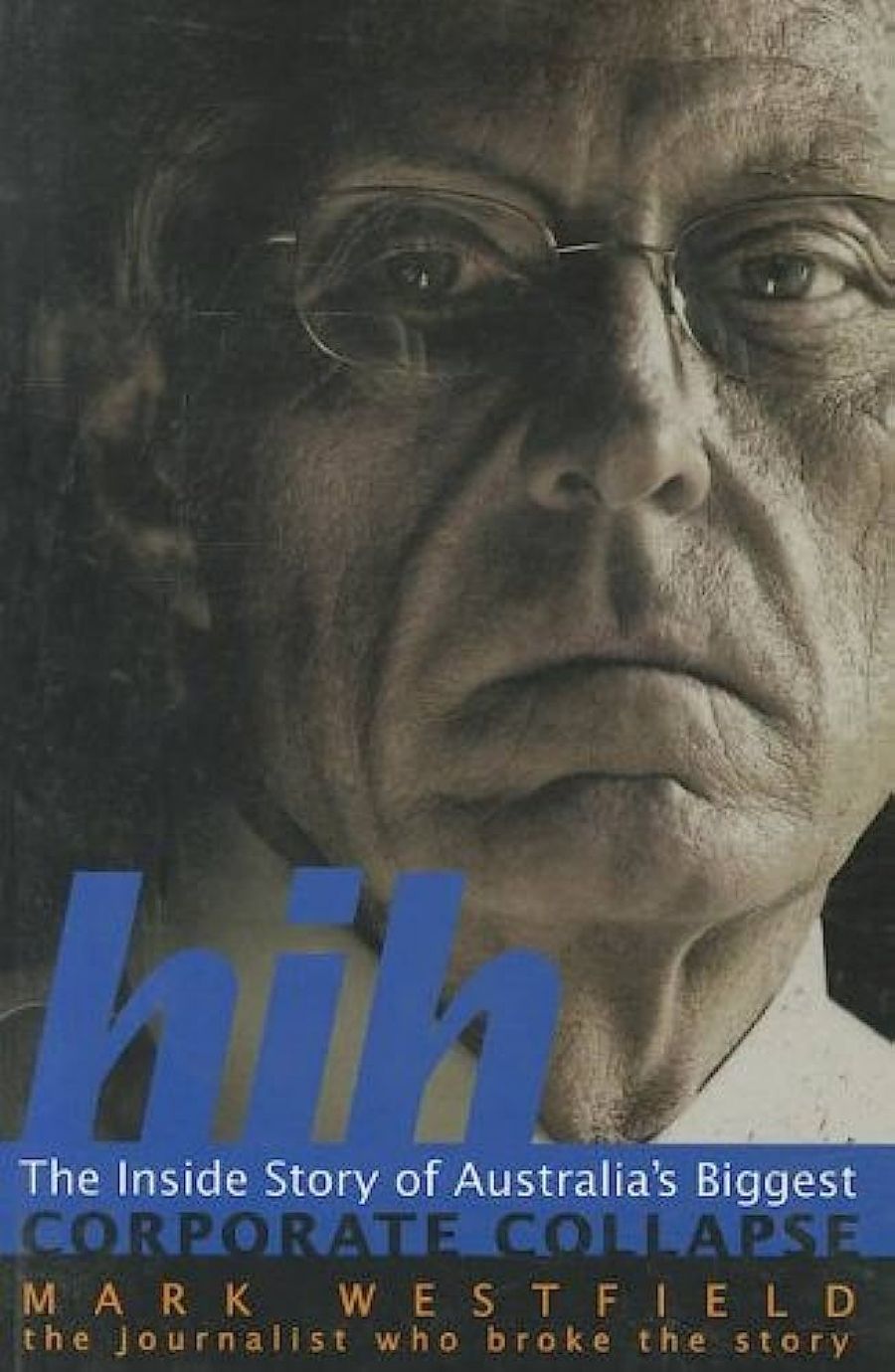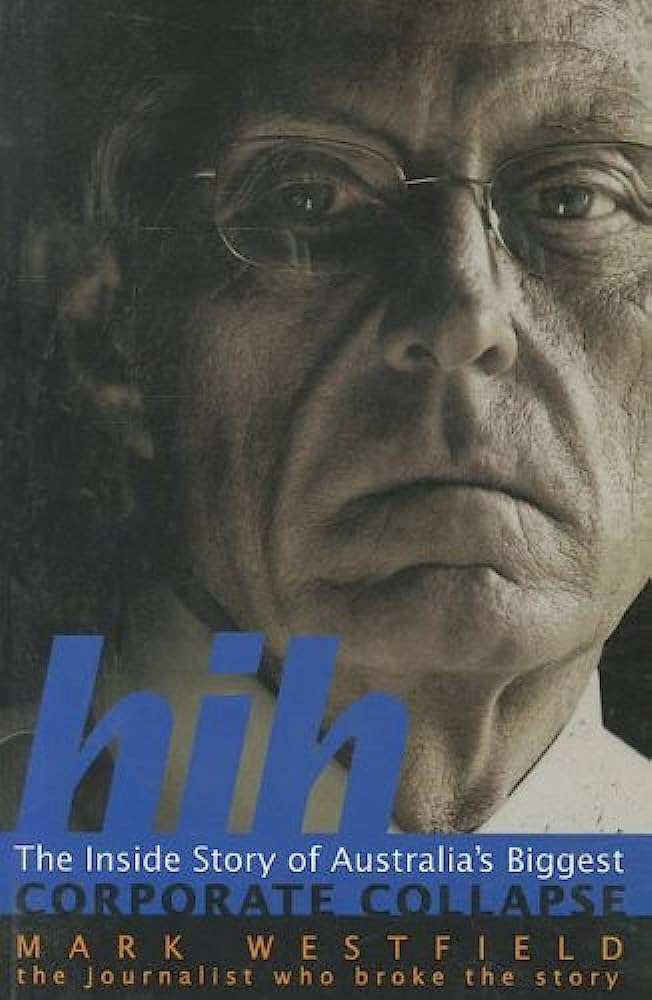
- Free Article: No
- Contents Category: Economics
- Review Article: Yes
- Article Title: Doctorates in Mateyness
- Online Only: No
- Custom Highlight Text:
If you like business bodice-rippers, these are blissful days. After the host of books that emerged from the dot com Götterdämmerung, another wave of cautionary tales has hit the shelves. I reached for Mark Westfield’s HIH after reading my third book about Enron, Mimi Swartz’s Power Failure, and was struck at once by a casual coincidence: that both Enron’s Ken Lay and HIH’s Ray Williams insisted on being referred to as ‘Doctor’. In Lay’s case, this was on account of his PhD in economics. Williams laid rather flimsier claim to his honorific, after Monash University rewarded him for various endowments with an honorary doctorate in laws in 1999.
- Book 1 Title: HIH
- Book 1 Subtitle: The inside story of Australia's biggest corporate collapse
- Book 1 Biblio: John Wiley & Sons $29.95 pb, 256 pp
- Book 1 Cover Small (400 x 600):

- Book 1 Cover (800 x 1200):

Westfield is an alert, energetic and intrepid journalist. Three years ago, he wrote a sound book on Pay TV, The Gatekeepers, then won a Walkley Award for his coverage of HIH’s disintegration – and rightly, for the company’s bullying did not deflect him one degree from his course. He has produced this book with a keen sense of pace, a tolerable level of detail, and commendable alacrity (Andrew Main’s rival work, Other People’s Money, isn’t due until July).
HIH’s fall is synoptically simple. Insurance is an appealing industry for those of an entrepreneurial bent. One collects premium income that one will not have to pay out for some time, if ever, and one can in the meantime invest it to maximum advantage – or what one guesses to be so. But HIH underprovided for future claims in order to maximise short-term profit even as it bid for more premium income through the acquisitions of CIC in April 1995 and FAI in September 1998. Combining HIH and CIC, says Westfield, entailed ‘putting two weak companies to create a combined entity of questionable strength’. HIH and FAI was like the scenario of Joe Millionaire, although it’s unclear who was the impostor and whom the gold-digger. It introduced to the mix the nouveau trasho figures of Rodney Adler and Brad Cooper, whose vanity and vacuity taxed HIH to the very end.
It’s when one seeks more than the story’s factual essence that Westfield’s HIH flags. Though not an outstanding writer, Swartz lifts Power Failure with succinct, allusive descriptions of its dramatis personae, like her introduction of the genial Dr Lay:
A very rich man as early as the mid-eighties, he was always able to convey, at least from a distance, that he was a man of simple tastes and good works. His dark eyes were unusually soulful, though they could turn as hard as onyx … He also had the politician’s gift – or the habit of a minister’s son, which he also was – for remembering not just your name, but the name of your sister, and the ability to recollect when she had recovered from her last heart surgery … The crowds parted for him with something like awe … and business could proceed with a feeling of the very best intentions.
There’s nothing like that in Westfield’s HIH. The impression are superficial, while the phrases too often read like the first ones that came to mind: characters ‘feel the heat’, are ‘fighting fires on all fronts’, have ‘real live fish on the line’, and give up ‘110 per cent’ of their time. There’s even ‘a swirling vortex’. And from the dead-headed deal-making, the only relief are asides, such as an observation of the relationship between Williams and his old English pal Michael Payne:
Increasingly he [Payne] resorted to the very Australian salutation ‘mate’, which was so out of context with his Englishness. In the desperate late night and early morning phone calls he made to Williams in Sydney, both men used the word ‘mate’ a lot.
Descriptions are more often perfunctory. Chairman Geoff Cohen is dismissed as ‘pleasant but pompous’, adviser Colin Richardson identikitted as a ‘short man with graying hair and no chin’. Cooper cops the Current Affair treatment: ‘It had been a long climb from the humble circumstances of the working-class cottages of Melbourne’s Northcote, leaving school with only rudimentary education and his first job as a butcher’s assistant.’ Clichés settle on Williams like iron filings on a magnet: ‘During the decade of the 1990s, Williams was a king, a finely-feathered cock of the walk. As the year 2000 drew to a close, he was an ageing man in his mid-sixties, his company was carrion and the vultures were circling.’
This shouldn’t necessarily discourage readers. Australian business has remained a closed book for too long, and Westfield opens it at least partly with vignettes of the ‘deal mania’ that afflicted HIH. At one stage, hoping to ‘brainstorm’ his HSI venture back to health, Cooper skedaddles to Hayman Island with two cronies and bombards Adler’s home fax with ‘page after page of scrawled, handwritten notes straight from Cooper’s fevered mind, a stream of scattered, misspelt consciousness’. Envisioning a ‘New direction vs Armageddon’, he conceives of a ‘$20 million Round Rodney to pay all debts’, concluding that ‘Life is then Good’. Oh no, it’s not. Ultimately, though, the book shares a shortcoming with its subject: like Williams’s HIH, Westfield’s HIH has simply been put together too quickly for its own good.


Comments powered by CComment